Jebel Ali: Exploring Dubai's Economic and Cultural Hub
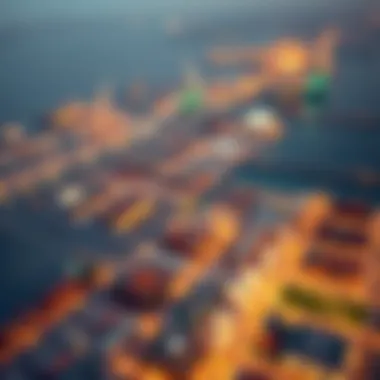

Intro
Jebel Ali is not just a spot on the map; it’s a thrumming nerve center of activity that plays a pivotal role in Dubai’s economic engine. As one of the most remarkable features of this area, Jebel Ali Port stands as the largest man-made port globally. This give it a key socio-economic importance. Beyond its commercial activity, residents and visitors experience a rich tapestry of community life, recreational options, and unique landscapes, all reflecting the distinctive spirit of Dubai.
This exploration delves into various facets of Jebel Ali, entrancing those who are intrigued by the layers of culture, community, and urban development. Homeowners, visitors, and planners will find themselves in the midst of a dynamic dialogue regarding the nuances that shape this vibrant district. As we traverse through the layers of Jebel Ali, we will peel back the curtain on the very aspects that underscore its significance in the broader narrative of Dubai.
Neighborhood Features
Jebel Ali is a region characterized by its mix of modernity and tradition. It represents a unique blend of bustling economic activity and serene residential pockets. The neighborhood offers both landscapes that inspire and architecture that tells a tale.
Landscaping Highlights
The landscaped areas within Jebel Ali are particularly noteworthy. They showcase a thoughtful integration of green spaces, parks, and waterfront promenades that cater to both leisure and leisurely strolls. The tranquil parks invite families for picnics, while the communal gardens foster a sense of belonging. The area’s landscape emphasizes sustainability, with native plants carefully selected to withstand the local climate, thus contributing to the environmental footprint.
Some of the more popular green spaces include:
- Jebel Ali Park: A favorite spot among families, featuring playgrounds and picnic areas.
- Jebel Ali Beach: This sandy shore offers relaxation and stunning views of the Dubai skyline, perfect for those seeking a coastal escape.
Architectural Styles
Architecturally, Jebel Ali presents a diverse array of styles, ranging from iconic modern structures to unique traditional designs. The blending of cultural influences is evident in its buildings, ranging from sleek office skyscrapers to charming villas.
Noteworthy architectural highlights include:
- Jebel Ali Free Zone Authority Tower: This striking building symbolizes the economic prowess of the area.
- Residential Complexes: These developments exhibit a variety of styles that create visually appealing neighborhoods, demonstrating the harmony between function and aesthetics.
Community Life
Life in Jebel Ali is rich and vibrant, with an engaging community that thrives through local events and activities. Diverse groups of residents breathe life into the district, fostering an inviting atmosphere that embraces the multicultural nature of Dubai.
Local Events and Activities
Throughout the year, Jebel Ali hosts a variety of events that capture the essence of community spirit. Whether it’s a cultural festival that highlights the diverse heritages of its inhabitants or community clean-up drives that foster environmental consciousness, there’s always something happening.
Some recurring highlights include:
- Jebel Ali Community Day: An annual event showcasing local talent, crafts, and cuisines.
- Fitness Festivals: Run, yoga classes, and workshops aimed at promoting health and well-being.
Lifestyle Amenities
Lifestyle amenities in Jebel Ali cater to a variety of needs, ensuring that the community is equipped with all necessities for both relaxation and day-to-day activities. From shopping centers that provide local and international brands to fitness facilities that encourage an active lifestyle, everything is within reach.
Key amenities include:
- Jebel Ali Mall: A vibrant shopping hub offering a plethora of options for retail therapy.
- Diverse Dining Options: Ranging from traditional Middle Eastern to global cuisines, there’s something for every palate.
Community life in Jebel Ali reflects a mosaic of cultures and lifestyles, enriching the experience of everyone who calls this area home. Through understanding Jebel Ali's detailed neighborhoods and community engagements, we start to realize its vital role in shaping Dubai's identity.
Prolusion to Jebel Ali
Jebel Ali holds a significant position in the urban fabric of Dubai. This sprawling area is not just a geographical spot; it represents the confluence of industry, community, and culture. Given its dynamic nature, Jebel Ali serves as a magnet for businesses and residents alike, making it crucial for anyone interested in the socio-economic landscape of the UAE.
Understanding Jebel Ali means diving into its multifaceted role. The area is closely tied to Dubai's identity, both as a gateway for international trade and as a vibrant community space. With the bustling Jebel Ali Port, known as one of the largest man-made ports globally, the area plays a pivotal role in facilitating global trade. It's more than just cargo and shipping; this is where logistics and economy intertwine with everyday life.
By examining Jebel Ali, we gain insights not only into its economic contributions but also into how it shapes lifestyles and communities. The area's residential developments, cultural attractions, and green spaces all contribute to a unique environment that balances industry with livability.
Historical Overview
The history of Jebel Ali dates back to the early 1970s when plans for the port and associated developments were conceived. The vision then was clear: to position Dubai as a strategic point for maritime trade. The opening of Jebel Ali Port in 1978 marked a turning point, setting the stage for the area to evolve into a bustling economic hub.
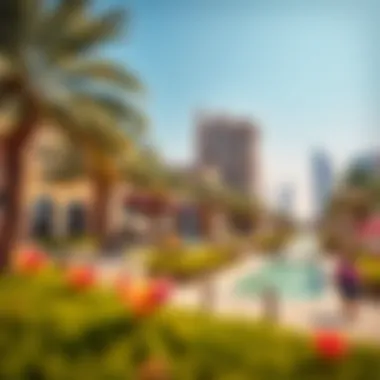
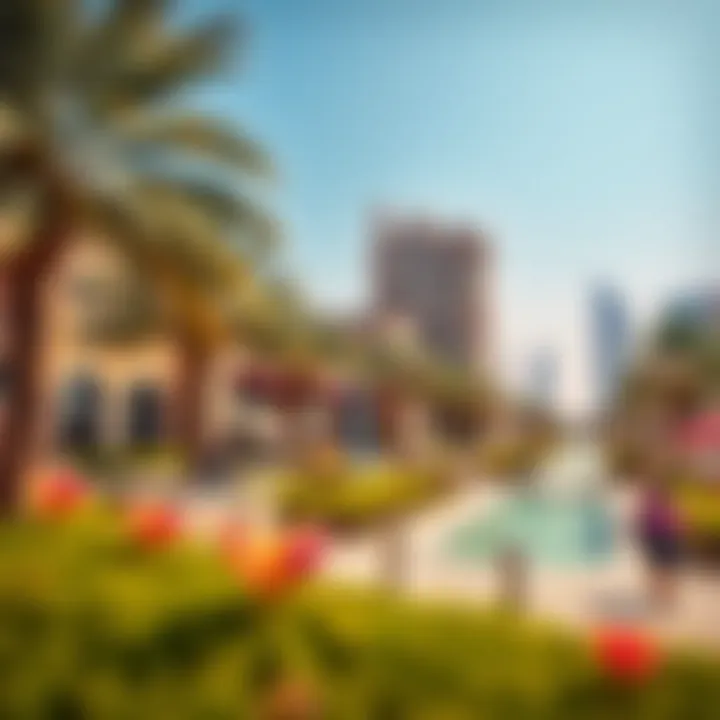
Over the years, it has witnessed significant growth. Initially, it was a modest port area, but as trade expanded, so did the infrastructure surrounding it. From warehouses to logistics companies, Jebel Ali became the backbone for many enterprises. The government recognized the potential here, declaring it a free zone in 1985, providing incentives that attracted foreign investment. This decision alone catalyzed a rapid transformation in the area, pushing it to the forefront of Dubai’s economic landscape.
Geographical Significance
The geographical positioning of Jebel Ali is nothing short of strategic. Situated on the southwestern outskirts of the city, it connects seamlessly to major road networks and is in proximity to the Arabian Gulf, making it an ideal location for shipping and logistics.
What sets Jebel Ali apart is not just the port but the infrastructure that supports it. The area is well-connected by Sheikh Zayed Road, one of the vital arteries in Dubai. This facilitates easy access to the rest of the emirate and beyond, propelling businesses to thrive. Moreover, its close location to Expo 2020 site has further enhanced its profile as a crucial part of Dubai's development plans.
Additionally, its proximity to the Al Maktoum International Airport creates a synergy between air and sea transport, providing comprehensive logistics solutions that few places in the world can match. Therefore, the geographical importance of Jebel Ali extends beyond mere distances; it encompasses a strategic dominance that bolsters Dubai’s status as a global trade center.
"Jebel Ali is where Dubai’s industrial spirit meets its rich cultural heritage, encapsulating the essence of the emirate’s growth and ambition."
Economic Landscape
The economic landscape of Jebel Ali is pivotal to understanding the broader dynamics of Dubai's growth. This thriving hub does not just represent a geographic location but embodies a melting pot of commerce, trade, and innovation. Its economic significance is underscored by an intricate interplay of global logistics and local entrepreneurship, establishing a robust foundation for both residents and businesses alike.
Jebel Ali Port and Free Zone
Jebel Ali Port stands tall as one of the largest man-made ports world-wide, a bustling nexus of maritime activity that solidifies Dubai's position as a global trading powerhouse. Over the years, it has evolved from a mere docking station into a sophisticated entity enabling vast cargo trading. The port boasts a capacity to handle millions of TEUs (Twenty-foot Equivalent Units) annually, establishing reliable shipping routes that choke choke, err—dominate traffic across the globe.
The adjoining Jebel Ali Free Zone further amplifies this economic vigor, attracting over 7,000 companies from diverse sectors. This area allows businesses to operate with 100% foreign ownership and offers a myriad of tax incentives. It’s not just about the logistics but also about fostering an environment where innovation thrives. Whether it’s tech start-ups or large manufacturers, companies find Jebel Ali to be an appealing venture into a thriving market.
Moreover, the logistical advantages are complemented by supportive regulatory frameworks that streamline processes for businesses. With modern facilities and proximity to significant transport routes, it's a prime spot for firms looking to cut transportation costs and time. Jebel Ali Port and Free Zone do not just contribute to an economic landscape; they sculpt its very foundation, making Dubai a canvas of opportunity.
"The synergy between Jebel Ali Port and its Free Zone creates a business ecosystem that is unparalleled in the region."
Impact on Dubai's Economy
The ripple effects of Jebel Ali's economic activities resonate throughout Dubai's economy at large. A significant portion of the emirate's GDP is attributed to the trade activities stemming from the port and the free zone. Moreover, the employment generated through these enterprises directly impacts the local population. Thousands of jobs ranging from administrative roles to skilled labor are formed, weaving a fabric of economic sustainability across the region.
Additionally, as foreign companies flock to escape their respective home market constraints, they contribute not just capital but also knowledge. This influx fosters a diverse business culture that enhances competition and encourages local entrepreneurs to innovate and expand their horizons.
Furthermore, tourism sees a boost, as business travelers often linger for leisure in Dubai, exploring the rich culture and entertainment options available after work hours. Jebel Ali directly enhances Dubai's allure as a destination for business tourism, which continues to gain traction.
For further reading on its economic impact, you may refer to:
Understanding this economic landscape sets the stage for any discussion on community dynamics, lifestyle offerings, or future developments in Jebel Ali.
Community and Lifestyle
The heart and soul of any bustling area lie in its community and lifestyle. Jebel Ali exhibits a unique tapestry of culture, modernity, and tradition, all woven together by its residents. This adaptability makes it an ideal enclave for families, expatriates, and visitors, offering the perfect balance between work and leisure.
Residential Developments
Types of Housing
In Jebel Ali, the types of housing available cater to diverse needs and preferences. From luxurious villas that scream opulence to modest apartments that offer comfort without breaking the bank, there’s something for everyone. The standout feature of these residential options is their architectural diversity. For instance, while some prefer contemporary designs with sleek lines and spacious layouts, others might lean towards traditional Arabic styles that resonate with the region's heritage.
Having a variety of housing types helps create an inclusive environment where families can grow and thrive. Especailly, gated communities provide an extra layer of security and privacy, making them a popular choice among families looking for peace of mind. Newer developments also often include smart home technology, enhancing convenience and efficiency, but affordability can vary widely depending on location and amenities.
Affordability and Accessibility
Affordability in Jebel Ali holds considerable weight for new residents and buyers alike. Many find that living in this area provides a relatively lower cost of housing compared to more central parts of Dubai, while still retaining a high quality of life.
Accessibility is another strong point here; residents benefit from well-established roads and proximity to the Dubai Metro. However, potential buyers should be aware that some housing options might carry hidden costs, like annual fees for community upkeep, which should be factored into the total budget. Most families appreciate that despite varying prices, chances are they can find a home that resonates with their lifestyle and budget preferences.
Cultural Attractions
Exhibitions and Events
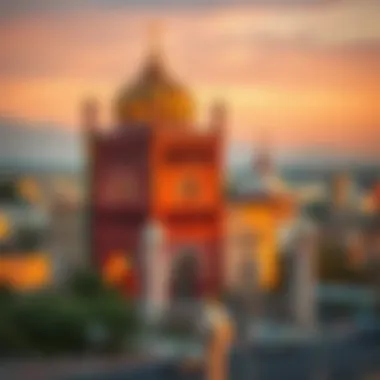
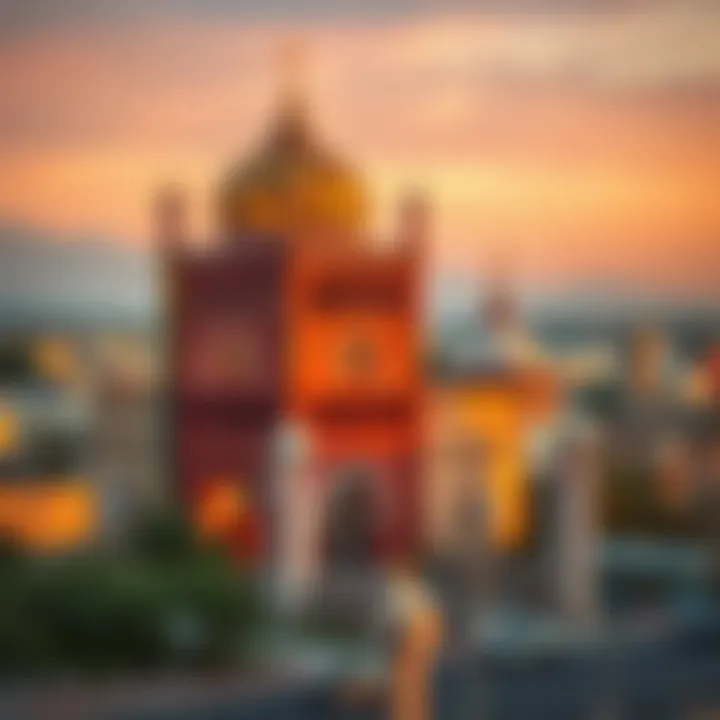
Cultural attractions in Jebel Ali are a vibrant part of its identity. Regular exhibitions and events highlight local talents and global rhythms. These gatherings not only enrich the community but also foster connections among diverse groups. The allure of art festivals and food fairs provides residents and visitors opportunities to celebrate creativity and culinary diversity.
Participating in these events is a beneficial experience, as they introduce people to local culture and traditions while allowing for fantastic networking. However, timing can be a challenge for busy residents trying to juggle work and leisure.
Community Centers
Community centers serve as the backbone of social interaction in Jebel Ali. These hubs offer a wide range of activities like classes, workshops, and social gatherings, aiming to build a closely-knit community. Not only do they provide a venue for learning, but they also encourage collaboration among residents.
The unique aspect of these centers is their ability to adapt and meet the needs of the community, often creating space for family-friendly activities. While they play a crucial role, some residents may find they aren't as well-funded or supported as one would wish for, leading to limitations in programming.
Recreational Spaces
Parks and Green Spaces
Recreational spaces, particularly parks and green areas, are invaluable in today's urban living. Jebel Ali is home to several well-maintained parks that offer a slice of nature amid the sprawling city. Families and fitness enthusiasts often frequent these areas for picnics, jogging trails, or simply soaking up the sun.
The key characteristic of these parks is their thoughtfully designed features, like children's play areas and outdoor exercise equipment, making them family-friendly. However, with increasing urban development, maintaining green spaces becomes a greater concern. Residents often advocate for preserving these areas, emphasizing their importance in balancing urban life with nature.
Sports Facilities
Sports facilities are another essential aspect of Jebel Ali's recreational offerings. From gyms and pools to multi-sport arenas, these centers cater to various sports needs. The vibrancy of youth leagues and adult leagues reflects the community's enthusiasm for sports.
One clear advantage of having top-notch facilities is that they encourage a healthy lifestyle and foster community spirit. Engaging in team sports creates bonds among residents, enriching their social experience. However, some may find the accessibility of these facilities limited due to membership fees or capacity constraints, which could hinder spontaneous use.
Transport and Connectivity
Transport and connectivity in Jebel Ali serve as the backbone of its bustling community and thriving economy. This area, notable for its expansive port and strategic location, has developed a comprehensive infrastructure that facilitates not only local commuting but also international trade. Understanding this connectivity landscape is crucial for homeowners, visitors, urban planners, and architects alike.
Road Infrastructure
Jebel Ali is crisscrossed by high-quality road networks that cater to its rapid economic growth. Major roads such as Sheikh Zayed Road and the Emirate Road link Jebel Ali to other key areas in Dubai and beyond. These highways are not just mere arteries for transport; they represent the lifeline of logistics that makes Jebel Ali pivotal in UAE’s economic framework.
The continuous investments in road upgrades speak volumes about the commitment to enhancing connectivity. Recent developments include the expansion of lanes to minimize congestion, which can be a common occurrence during peak hours. The Roads and Transport Authority (RTA) has also introduced smart traffic systems that optimize flow, reducing travel time for commuters—a key aspect for businesses depending on timely deliveries.
Furthermore, these roads help residents access essential services. Grocery shops, schools, and healthcare facilities are within reasonable distance, making everyday life more manageable. While Jebel Ali remains a hub for industrial activity, planning efforts mean it will increasingly accommodate residential developments without sacrificing convenience.
Public Transport Options
With Jebel Ali's robust infrastructure in place, public transport is a growing focus aimed at accommodating both residents and the workforce that frequents the area. The Dubai Metro is one of the crown jewels of public transport here. The Metro's Red Line has a station at Jebel Ali, making it easy for locals and visitors to traverse the city without needing a car.
Moreover, the bus network in Jebel Ali ensures that even the more remote corners are accessible. Regular routes connect residential areas with employment zones effectively. It is worth noting that these public transport options are economical, offering an inclusive travel alternative for those who may find car ownership costly.
In addition to traditional bus and metro services, there has been an uptick in bike-sharing systems that promote environmentally friendly commuting. This aligns with the global push toward more sustainable urban developments, encouraging less reliance on fossil fuel-powered vehicles.
Public transport initiatives in Jebel Ali not only ease traffic congestion but also contribute to reducing the carbon footprint.
"Efficient transport and connectivity play pivotal roles in molding a community's economic and social environment."
In summary, the transport and connectivity landscape of Jebel Ali bridges industrial strength with community-focused living. With ongoing developments and upgrades, Jebel Ali is poised to become an even more accessible and welcoming area for both residents and businesses.
Environmental Considerations
Environmental considerations are pivotal when discussing Jebel Ali, especially given its rapid development and significance as a logistical and industrial powerhouse. As the area continues to evolve, understanding the environmental challenges and initiatives will prove beneficial not only for the residents and businesses within Jebel Ali but also for the broader community in Dubai.
The challenges presented by industrial activities, urbanization, and population growth necessitate a commitment to sustainable practices. This commitment can lead to numerous benefits, such as improved air quality, enhanced biodiversity, and a greater quality of life overall. Thus, examining how Jebel Ali approaches environmental issues offers a clear window into its future, harmonizing growth with ecological stewardship.
Sustainability Initiatives
In recent years, Jebel Ali has made significant strides in implementing sustainability initiatives aimed at reducing its carbon footprint and promoting eco-friendly practices. From efficient waste management to energy conservation, these initiatives align closely with Dubai's overarching vision of becoming a world leader in sustainable urban living.
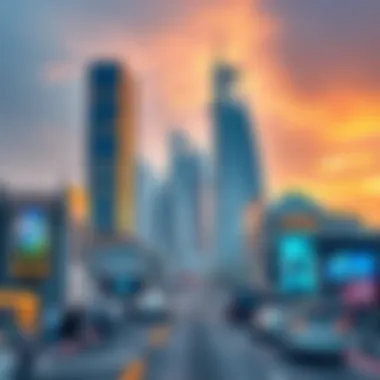

Key sustainability efforts in the area include:
- Energy Efficiency: A range of industries in Jebel Ali adopt practices like utilizing renewable energy sources, including solar panels, to power their operations. This not only cuts costs but also reduces dependency on fossil fuels.
- Water Conservation: Given the arid climate, projects focusing on desalination and greywater recycling have been initiated to promote responsible water use.
- Waste Management Programs: These programs aim to minimize landfill waste through recycling and composting, ensuring that materials are reused effectively rather than discarded.
"Sustainable initiatives in Jebel Ali are not merely a reaction to external pressures but rather a proactive step towards a more resilient and responsible urban environment."
Green Spaces Development
The development of green spaces is another crucial aspect of Jebel Ali’s environmental strategies. As the urban footprint expands, the introduction and enhancement of parks and natural areas are vital for maintaining a balance in the ecosystem. Green spaces not only provide aesthetic value but also serve essential functions, such as improving air quality and providing habitats for local flora and fauna.
Noteworthy aspects of green spaces in Jebel Ali include:
- Public Parks: Various public parks are being constructed to serve as community gathering places, promoting social interaction among residents.
- Landscape Design: Landscape architecture that emphasizes native plants and sustainable practices ensures that these green areas can thrive in the local climate without excessive resource expenditure.
- Biodiversity Projects: Initiatives aimed at preserving and enhancing local species contribute to the environmental resilience of the area, allowing it to adapt to climate change impacts effectively.
The commitment to creating and maintaining these green spaces reveals a strategic approach to urban planning in Jebel Ali, reflecting an understanding that a healthy environment is essential for the well-being and quality of life of its community.
By weaving together industrial growth with environmental consciousness, Jebel Ali showcases a path that other regions might look to emulate. The balance of economic needs and ecological responsibilities is not just a hopeful ideal but a functional reality in this dynamic hub.
Future Prospects
The future prospects of Jebel Ali highlight its potential to shape not just Dubai’s economy, but also its socio-cultural landscape. As areas undergo urban and economic transformation, the forward-looking vision for Jebel Ali emphasizes innovation, sustainability, and community development. By understanding this direction, stakeholders can better position themselves to benefit from the opportunities arising in this dynamic hub.
Understanding the significance of this section requires awareness of several key elements. Firstly, ongoing and upcoming projects are crucial to enhancing the infrastructure and facilities, thereby attracting more businesses and residents. Furthermore, long-term urban planning efforts ensure that the area develops sensibly, addressing challenges like congestion, environmental impact, and resource management.
Upcoming Projects
Jebel Ali is poised for numerous projects that promise to contribute significantly to its growth. Here are a few noteworthy initiatives:
- Dubai Logistics City: Aimed at bolstering logistics capabilities, this project will allow Jebel Ali to accommodate increased trade volume efficiently.
- Bluewaters Island: This development will add to the entertainment landscape, bringing in hotels, restaurants, and retail spaces to enrich visitor experiences.
- Dubai Marina Expansion: Enhancing the connectivity between Jebel Ali and the Marina area is critical for both residents and visitors, streamlining transport and improving accessibility.
An exciting aspect of these upcoming projects is the emphasis on environmentally friendly technologies and practices. By prioritizing sustainability, Jebel Ali sets a standard for modern developments, ensuring that economic growth does not come at the expense of the environment. \n
Long-term Urban Planning
Long-term urban planning in Jebel Ali is structured to facilitate coherent growth that aligns with Dubai's broader vision. This approach incorporates the following considerations:
- Zoning Regulations: Establishing clear regulations for residential, commercial, and industrial areas helps maintain balance and predictability in development.
- Infrastructure Improvements: Continuous upgrades in road networks, public transport links, and utilities are vital for supporting population growth and economic activity.
- Community Engagement: Involving local residents in the planning process ensures that developments reflect the needs and desires of the community. This can foster a sense of belonging and improve overall quality of life.
- Environmental Sustainability: Future plans prominently feature green spaces and smart city initiatives that reduce environmental impacts while enhancing the urban landscape.
"The integration of sustainability into the urban fabric of Jebel Ali will be vital to ensuring its long-term success."
As Homeowners, visitors, and urban planners look towards the horizon, the forward-thinking elements discussed here not only provide an optimistic outlook but also form the backbone of Jebel Ali's ongoing evolution.
Closure
The significance of concluding an exploration of Jebel Ali hinges on its multifaceted nature as a vital cog in Dubai's broader machinery. This dynamic area is not merely a geographical point on a map; it encapsulates the interplay of industry, community, and sustainability. Understanding Jebel Ali is crucial for several reasons.
Firstly, the economic implications cannot be overstated. With the port being one of the largest man-made structures in the world, it is not just about shipping goods. It supports an entire ecosystem of trade, logistics, and business opportunities that benefit not just local residents but also international traders looking at Dubai as a launch pad for their operations.
Secondly, Jebel Ali's residential developments offer a unique lens through which we can analyze the community's evolution. The diverse housing options, affordability, and accessibility shape not only the demographics of the area but also the character of life therein. As urban planners and architects look ahead, they can leverage these insights to foster a sustainable living environment that harmonizes commerce with quality living spaces.
Finally, as concerns about environment intensify, understanding the sustainability initiatives in Jebel Ali provides lessons that can be applied elsewhere. The balance between green spaces and urban development reflects a broader commitment to preserving quality of life while driving economic growth.
In essence, the culmination of this exploration draws attention to Jebel Ali as a microcosm of Dubai itself—where tradition meets modernity, and commerce blends with culture. For homeowners, visitors, and planners, grasping these insights is more than academic; it’s fundamental for making informed decisions that resonate with the future trajectories of urban development.
Summary of Insights
- Economic Powerhouse: Jebel Ali's port is a cornerstone of trade, influencing local and international markets.
- Community Diversity: The area features varied housing options that cater to a range of socioeconomic strata, enhancing community diversity.
- Sustainability Focus: Ongoing initiatives champion environmentally sustainable practices amidst urban expansion.
Final Thoughts on Jebel Ali
As we wrap up this exploration of Jebel Ali, it's essential to recognize its role as not just a place but a living model of progress and adaptability. As Dubai continues to evolve, so too will Jebel Ali, remaining a crucial part of the narrative in the city's growth story. For both prospective investors and residents, the insights gathered here serve as a guide, sparking questions and considerations that will shape future endeavors in this ever-changing landscape. The community's resilience and the area's strategic importance assure us that Jebel Ali will be pivotal in defining not just the present, but the future as well.
"A city's greatness is measured by the welfare of its smallest citizens," and in Jebel Ali, we see this motto being put into practice as the area strives for inclusivity and innovation.
For further reading on urban development and community planning, check out resources from Wikipedia and Britannica.
Also, be sure to explore forums like Reddit for community insights and real experiences.















